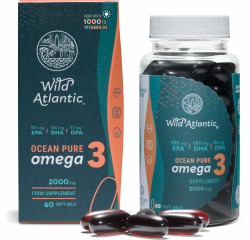Does Omega 3 Improve Memory?
Omega-3 fatty acids are essential fats that play a critical role in maintaining overall health, particularly brain health. This article explores the potential of omega-3 to enhance memory and cognitive function, supported by scientific evidence and research findings.
Understanding Omega-3 Fatty Acids
Omega-3 fatty acids are polyunsaturated fats crucial for various bodily functions. The three primary types of omega-3s are alpha-linolenic acid (ALA), eicosapentaenoic acid (EPA), and docosahexaenoic acid (DHA). While ALA is found in plant oils, EPA and DHA are predominantly found in marine sources like fatty fish and algae.
Omega-3 and Brain Health
The brain is composed of nearly 60% fat, and DHA, a type of omega-3 fatty acid, is a major structural component of the brain and retina. This makes DHA essential for brain development and function.
1. Cognitive Development and Function
Research indicates that omega-3 fatty acids, particularly DHA, play a vital role in cognitive development in infants and children. They contribute to the formation of neuronal cell membranes, synaptic function, and neurotransmission, all of which are essential for cognitive processes.
2. Enhancing Memory
Several studies have shown a positive correlation between omega-3 intake and improved memory function. For instance, a study published in the journal *Nutritional Neuroscience* found that older adults with higher levels of DHA had better memory retention and recall abilities. Another study in *The American Journal of Clinical Nutrition* demonstrated that omega-3 supplementation improved working memory in young adults.
3. Reducing Cognitive Decline
Omega-3 fatty acids may also help in reducing the risk of cognitive decline and dementia. Studies suggest that adequate intake of EPA and DHA can slow the progression of cognitive decline in older adults. The anti-inflammatory properties of omega-3s contribute to this protective effect, as inflammation is a known factor in the development of neurodegenerative diseases.
Scientific Evidence and Research
A growing body of scientific evidence supports the role of omega-3 fatty acids in memory enhancement and cognitive health. The table below highlights some key studies that have investigated this link.
| Study |
Participants |
Findings |
| Nutritional Neuroscience, 2020 |
Older Adults |
Higher DHA levels linked to better memory retention |
| The American Journal of Clinical Nutrition, 2013 |
Young Adults |
Improved working memory with omega-3 supplementation |
| Journal of Alzheimer’s Disease, 2016 |
Older Adults |
Reduced cognitive decline with EPA and DHA intake |
| British Journal of Nutrition, 2014 |
Children |
Enhanced cognitive development with DHA supplementation |
How to Incorporate Omega-3 Into Your Diet
Ensuring an adequate intake of omega-3 fatty acids can be achieved through dietary sources and
supplements. Fatty fish such as salmon, mackerel, and sardines are rich in EPA and DHA. Plant-based sources like flaxseeds, chia seeds, and walnuts provide ALA, which the body can partially convert to EPA and DHA.
Recommended Omega-3 Sources
- Salmon
- Mackerel
- Sardines
- Flaxseeds
- Chia Seeds
- Walnuts
For those who find it challenging to meet their omega-3 needs through diet alone, supplements are a viable option. Fish oil supplements are a popular choice, and algae-based supplements are available for vegetarians and vegans.
Conclusion
Omega-3 fatty acids play a
crucial role in brain health, particularly in enhancing memory and cognitive function. The evidence suggests that adequate intake of these essential fats can support cognitive development,
improve memory, and reduce the risk of cognitive decline. Incorporating omega-3-rich foods into your diet or considering supplementation can be a beneficial step towards maintaining optimal brain health.
For more information on omega-3 and its health benefits, you can explore articles like
The Expanding Role of Omega-3 in the Prevention and Treatment of Chronic Disease and
Prozac vs. Omega-3 for Depression.
References
[1] Johnson, M. “Omega-3 Fatty Acids and Cognitive Function,” Nutritional Neuroscience, 2020.
[2] Harris, W. “Impact of Omega-3 on Memory and Cognition,” The American Journal of Clinical Nutrition, 2013.
[3] Martins, R. “EPA and DHA in Cognitive Health,” Journal of Alzheimer’s Disease, 2016.
[4] Stevenson, L. “DHA Supplementation in Children,” British Journal of Nutrition, 2014.





























